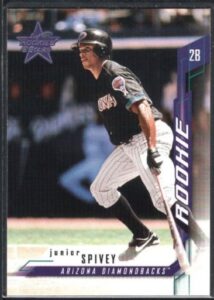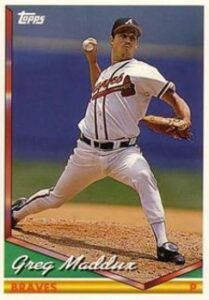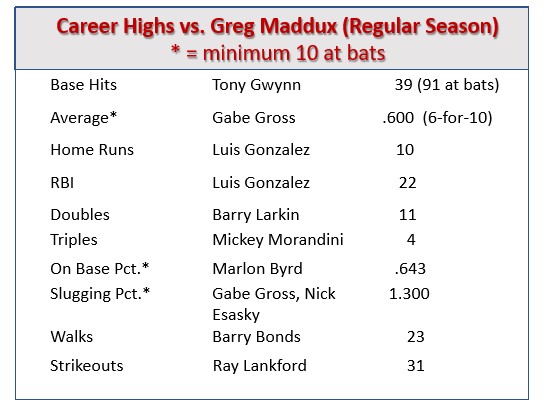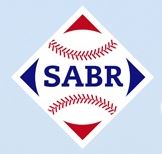Greg Maddux could put a baseball through a Life Saver if you asked him.
Hall of Famer Joe Morgan
Junior Spivey – first seven plate appearance versus Greg Maddux: six hits, one HBP, one walk.
 On August 12, 2001, Diamondback’s second baseman Junior Spivey faced future Hall of Famer Greg Maddux for the first time. Maddux was in his 16th MLB season and brought a 15-6 record and a 2.68 earned run average into the game. Maddux already had more than 250 major-league wins under his belt. Spivey, on the other hand, was in his rookie season, playing in just hit 42nd MLB game. He had a total of 27 MLB hits and a .276 average. It would seem to be “advantage Maddux.” Not so fast.
On August 12, 2001, Diamondback’s second baseman Junior Spivey faced future Hall of Famer Greg Maddux for the first time. Maddux was in his 16th MLB season and brought a 15-6 record and a 2.68 earned run average into the game. Maddux already had more than 250 major-league wins under his belt. Spivey, on the other hand, was in his rookie season, playing in just hit 42nd MLB game. He had a total of 27 MLB hits and a .276 average. It would seem to be “advantage Maddux.” Not so fast.
In his first at bat against Maddux (top of the first), Spivey singled and stole second. He faced him again in the third and singled again; in the fourth, he produced another single; and in the sixth, another single. Spivey picked up a fifth hit in the eighth inning, but Maddux was out of the game. Spivey didn’t face Maddux again until April 25, 2002 – and he seemed intent on proving that initial four-for-four wasn’t a fluke. He came to the plate three times and went hit-by-pitch, double, walk. Maddux finally retired Spivey for the first time in his first at bat on August 7 – in Spivey’s eighth career plate appearance versus “The Professor.” Spivey, who hit .270 over five MLB seasons (2001-2005) went 10-for-18 (.556) in seven career games versus Maddux.
In this post, the sixth in Baseball Roundtable’s “Whose Your Daddy?” series, we’ll take a look at a lineup of hitters who performed exceptionally well against Greg Maddux.
Who’s Your Daddy? What It’s All About.
On September 24, 2004, in the middle of a tight pennant race, the Yankees handed future Hall of Famer Pedro Martinez and the Boston Red Sox a tough 6-4 loss. Martinez went 7 1/3 innings giving up nine hits and five earned runs. The game came just five days after (in his previous start) Martinez had lasted just five frames against the Bronx Bombers (eight hits, eight earned runs) in a 16-7 loss.
After that second loss, Martinez candidly commented, “What can I say? I just tip my hat and call the Yankees my daddy.” Little did he know that his comment – and a Yankee fans’ chant of “Who’s your daddy?” would follow him into future starts in New York (all the way to his final MLB start – against the Yankees for the Phillies – in Game Six of the 2009 World Series.)
The concept of “Who’s your daddy?” became the inspiration for Baseball Roundtable to take a look at the players who “had the number” of some of MLB’s premier pitchers.
Here are links to the previous editions of this series:
- Nolan Ryan, click here.
- Sandy Koufax, click here.
- Pedro Martinez, click here.
- Bob Gibson, click here.
- Randy Johnson, click here.
BBRT Note: Keep in mind, the pitchers included in the “Who’s Your Daddy?” series are among the “best in the business.” They are selected not because of the players who performed well against them, but rather because solid hitter performance when they were on the mound was the exception rather than the rule.
Now, let’s take a look at the mound resume that earned Maddux a spot in this series – and then a lineup of players who seemed up to the task of facing Maddux’ mindful strike-zone mastery.
———————————————————————-
Greg Maddux
 Greg Maddux translated a fastball that peaked in the low 90s (mph) and was in the high 80s much of his career, an assortment of off-speed and breaking pitches (circle change, curve, slider, splitter), exceptional (beyond exceptional) control and a cerebral approach to pitching that earned him the nickname “The Professor” into 355 wins (eighth all time), a .610 winning percentage, four Cy Young Awards and a spot in the Baseball Hall of fame.
Greg Maddux translated a fastball that peaked in the low 90s (mph) and was in the high 80s much of his career, an assortment of off-speed and breaking pitches (circle change, curve, slider, splitter), exceptional (beyond exceptional) control and a cerebral approach to pitching that earned him the nickname “The Professor” into 355 wins (eighth all time), a .610 winning percentage, four Cy Young Awards and a spot in the Baseball Hall of fame.
I could probably throw harder if I wanted to,but why? When they’re in a jam, a lot of pitchers try to throw harder. Me, I try to locate better.
Greg Maddux
The 6’, 170-lb. right-hander was an eight-time All Star and won a record 18 Gold Gloves. Maddux won 15 or more games for an MLB record 17 consecutive seasons (18 times overall) and was twice a 20-game winner. He led the NL in wins three times, winning percentage twice, earned run average four times, games started seven times, complete games three times, shutouts five times and innings pitched five times. He also topped the league in fewest walks per nine inning nine times.
Greg Maddux was the first MLB pitcher to win four consecutive Cy Young Awards (1992-95). He was joined in this “club” by Randy Johnson (1999-2002).
Greg Maddux pitched for 23 MLB seasons (1986-2008). He pitched for the Braves (11 seasons); Cubs (10); Dodgers (2); and Padres (2). He went 355-227, 3.16 – with 109 complete games, 35 shutouts, 5,008 1/3 innings pitched, 3,371 strikeouts and 999 walks. For you trivia buffs, Greg Maddux made his major league debut in the bottom of the 17th inning of a Cubs-Astros game on September 3, 1983 – as a pinch runner (for Jody Davis). He stayed in the game and took the mound for the 18th inning, giving up a game-losing home run to Astros’ CF Billy Hatcher. In the game, the teams used a total of 53 players (17 pitchers).
Chicago’s Loss
In 1992, Greg Maddux went 20-11, 2.18 for the Chicago Cubs, leading the league in wins and earning the National League Cy Young Award. After some contentious contract negotiations, Maddux signed with the Braves (as a free agent) on December 9, 1992. The first regular-season opponent Maddux faced as a Brave? The Chicago Cubs – on Opening Day 1993 (April 5) at Wrigley Field. Maddux three 8 1/3 shutout innings (five hits, three walks and four strikeouts) and got the win in a 1-0 Braves victory. (Maddux won the Cy Young Award in each of his first three season with the Braves).
“Throwing a “Maddux.” What did Maddux bring to the mound? On July 22, 1997, Maddux carved up the Chicago Cubs in a 4-1 complete-game victory. He accomplished the feat in just 76 pitches, 63 of which were strikes. He did not go to a three-ball count on any batter and only two batters reached a two-ball count. Maddux mound mastery is “immortalized” in today’s expression “Throwing a Maddux,” described at MLB.com as tossing a complete-game, shutout using less than 100 pitches. Maddux accomplished the feat 13 times during his career. For you trivia buffs, Baseball-Almanac.com reports that the fewest pitches ever thrown in a nine-inning complete game is 58, by the Boston Braves’ Red Barrett in a 2-0, two-hit, no-walk, no-strikeout victory over the Reds on August 10. 1944. Time of game? One-hour and 15-minutes.
———————————————————
Now let’s look at Baseball Roundtable’s anti-Maddux lineup. As Baseball Roundtable selected this lineup, a number of factors were considered including, but not limited to, sample size (plate appearances), average and on-base percentage, power, walks versus strikeouts and Maddux’ record in the season in which the opposing batter found the most success. Like all things baseball, these selections are subject to discussion and debate.
Catcher – Javier Valentin … Announcing his presence with authority.
Javier Valentin, catching for the Reds, announced his presence to Greg Maddux “with authority.” He first faced Maddux on July 22, 2004. In his first at bat against Maddux, Valentin took him deep (right field) on an 0-1 pitch to lead off the third inning and tie the game 1-1. Javier faced Maddux again with two outs in the sixth and the Reds trailing 6-1. On the first pitch of that at bat, he again homered to deep right. So, now he had seen three pitches from Maddux and had two home runs to show for it. Valentin went two-for-three (in a game in which Maddux went the distance and gave up only four safeties) – and his two long balls were the only runs scored off Maddux that day. Javier went on to face Maddux 29 times (in 12 games) in his career and hit a robust .393, with two doubles, five home runs and eight RBI. His five home runs tied for the fifth-most against Maddux and he did it in just 29 plate appearance. None ahead of him had fewer than 91. No other player with at least five regular-season long balls against Maddux did it in fewer than 50 plate appearances.
 Valentin had a 10-season MLB career (1997-99, 2002-2008 …Reds, Twins, Devil Rays), hitting .251, with 45 home runs and 210 RBI in 631 games. He had more hits, more home runs and RBI against Maddux than he had against any other pitcher. Valentin’s best season was 2005, when he went .281-14-50 for the Reds. Side note: Valentin never appeared in 100 games in any MLB season.
Valentin had a 10-season MLB career (1997-99, 2002-2008 …Reds, Twins, Devil Rays), hitting .251, with 45 home runs and 210 RBI in 631 games. He had more hits, more home runs and RBI against Maddux than he had against any other pitcher. Valentin’s best season was 2005, when he went .281-14-50 for the Reds. Side note: Valentin never appeared in 100 games in any MLB season.
Honorable mention at catcher goes to Benito Santiago, who put up a .289-6-17 line against Maddux in 29 games.
________________________
First Base – Jeff Bagwell … Seven dingers and 17 RBI.
In 28 regular-season games versus Maddux, Bagwell went .305-7-17. He also was hit by a pitch three times, second only Andres Gallaraga’s four. Bagwell’s seven home runs versus Maddux are the third-most of any hitter, while his 17 RBI rank fourth. His 91 plate appearances are 14th.
Bagwell played 15 MLB seasons (1991-2005), all for the Astros. He was a four-time All Star, who led the NL in games played four times, runs scored three times and home runs, RBI, walks and total bases once each. He was the National Rookie of the Year in 1991 and the MVP in 1994, when he hit .368, with 39 home runs – and led the league in both runs scored (104) and RBI (116). He also stole 15 bases and won a Gold Glove that season. For his career, Bagwell put up a .297 average (2,314 hits), 488 home runs, 1,529 RBI, 1,517 runs scored and 202 steals. He topped 30 home runs in nine seasons (40+ three times) and stole 30 or more bases twice.
______________________
Second Base – Jeff Kent … Picked up the pace after a slow start.
There was a bit of competition here, with Jeff Kent’s power giving him an edge of Mickey Morandini. Considering his slow start against Maddux, Kent’s final number (.330-5-13) are even more impressive. In his first two season versus “The Professor” (1992-93), Kent came to the plate 15 times and recorded just one single and one hit by pitch – with six of his 12 outs being strikeouts. From 1994 to 2008, he hit .378 (28-for-74).
Jeff Kent played 17 MLB seasons (1992-2008 … Giants, Mets, Dodgers, Astros, Indians, Blue jays). He hit .290 (2,461 hits), with 377 home runs and 1,518 RBI. Kent was five-time All Star and the 2000 NL MVP, when he hit .334, with 33 home runs and 125 RBI. Kent hit 30 or more home runs in three seasons and drove in 100+ runs in eight campaigns.
Jeff Kent’s 351 career home runs while in the lineup as a second baseman are the most ever for a keystone sacker.
Honorable mentions at second base go Junior Spivey (whose performance was described earlier) and to Mickey Morandini, who hit .344-1-8 against Maddux in 29 regular season games – and also holds the all-time triples mark against him (4). All of Spivey’s plate appearances against Maddux, however, came in the final four seasons of Maddux’ career. Again, for trivia buffs, Greg Maddux took the mound for the final time in his career as a Dodger (September 27, 2008), giving up one run on two hits in a 2-1 win over the Giants in San Francisco.
____________________________
Third Base – Mike Lowell … A .367 average in 20 games.
Mike Lowell had just one hit (a single) in his first eight career at bats against Greg Maddux, but (like Jeff Bagwell) he picked up the pace. In 20 career games versus Maddux, Lowell hit .367 (18-for-49) with four home runs and eight RBI.
Mike Lowell had a 13-season MLB career (1998-2010 … Marlins, Red Sox, Yankees). He was a four-time All Star and won a Gold Glove in 2005. Lowell finished his career with a .279 average (1,619 hits), 223 home runs and 952 RBI. He hit 20 or more home runs in six seasons (a high of 32 in 2003); three times topped 100 RBI; and hit over .30o once (.324 in 2007).
Honorable mention at third base goes to Howard Johnson, who hit .284-5-13 against Maddux in 28 games. The edge fges to Lowell based on his average and the fact the Lowell fanned just five times in 20 games versus Maddux, while Johnson fanned 18 times in 28 games.
________________________
Shortstop – Orlando Cabrera … Fanned only once in 50 plate appearance.
Orlando Cabrera hit .340 versus Greg Maddux – 16-for-47 in 16 games, with six extra base hits. He also fanned only once versus Maddux in 50 plate appearances.
 Cabrera was a true journeyman, playing for nine teams (Expos, Angels, Twins, Giants, A’s, Red Sox, Indians, Reds and White Sox), after spending his first seven seasons in Montreal. His MLB career stretched from 1997-2011. Cabrera had a career .272 average (2,055 hits), with 854 RBI, 985 runs scored, 123 home runs and 216 steals (29 or more steals in five seasons). He was also a two-time Gold Glover. Cabrera played in the post season with five clubs (Red Sox, Angels, White Sox, Twins and Reds), hitting .228 with 18 RBI in 37 post-season games.
Cabrera was a true journeyman, playing for nine teams (Expos, Angels, Twins, Giants, A’s, Red Sox, Indians, Reds and White Sox), after spending his first seven seasons in Montreal. His MLB career stretched from 1997-2011. Cabrera had a career .272 average (2,055 hits), with 854 RBI, 985 runs scored, 123 home runs and 216 steals (29 or more steals in five seasons). He was also a two-time Gold Glover. Cabrera played in the post season with five clubs (Red Sox, Angels, White Sox, Twins and Reds), hitting .228 with 18 RBI in 37 post-season games.
_______________________________
How About a Utility Player?
If I could pick a utility man it would be Bip Roberts, who started four games at third base, four at second base, two in left field, one in center field and one at shortstop against Maddux. He didn’t show much power, but he made consistent contact and exhibited a good eye at the plate versus Maddux. In 13 games against the control master, Roberts walked seven times and fanned just four. He also had 16 hits (four doubles) for a .471 career average versus Maddux. In 1989, Roberts faced Maddux eight times and reached base six (three hits and three walks.).
Outfield – Tony Gwynn … 103 regular-season plate appearances, no strikeouts.
He’s (Maddux) like a surgeon out there … he puts the ball where he wants to.
Eight-time batting champion and Hall of Famer, Tony Gwynn
Despite the respect shown in the above comment, Tony Gwynn faced Greg Maddux 103 times in regular-season games – and never struck out (and another four times in the post-season without a whiff.
Tony Gwynn collected more regular season hits against Greg Maddux than any other batter (39 in 33 games). He also had the second-most regular-season doubles, fifth-most walks and second-most intentional walks. In his first game against Maddux, Gwynn was intentionally walked twice and grounded out twice.
Tony Gwynn was a standout player in both baseball and basketball at San Diego State University, earning All-Conference (Western Athletic Conference) honors in both sports, He was drafted by both the San Diego Padres and the NBA San Diego Clippers.
Gwynn’s best season versus Maddux was 1990, when he when he went 8-for-12 (.667) against him in four games. He hit .500 or better against Maddux in seven of the 15 seasons in which he faced him.
Tony Gwynn played 20 MLB seasons (1982-2001), all with the Padres. He was an eight-time batting champion and led the NL in hits seven times (topping 200 safeties in five seasons). He was an All Star in fifteen seasons and a Gold Glover in five. He also stole 25 or more bases five times, with a high of 56 in 1987. A “pure” hitter, Gwynn also led the NL in at bats per strikeout in 10 seasons. In 1995, he fanned just 15 times in 577 plate appearances (535 at bats). Gwynn retired with a .338 average (3,141 hits), 1,383 runs scored, 1,138 RBI, 543 doubles, 135 home runs and 319 steals.
_________________________________
Outfield – Luis Gonzalez … Only player to reach double-digit home runs.
Luis Gonzalez, hit more home runs (10) and drove in more runs (22) than any other hitter against Maddux (38 regular-season games).
Gonzalez got off to a good start against Maddux. In his first game against “The Professor” (May 1, 1991), Gonzalez had a single on the first pitch he ever saw from Maddux in the third inning; a two-run home run on the first pitch he saw in the fourth, a four-pitch walk in the sixth; a two-run home run on the first pitch he saw in the eighth. Think about it, on just seven pitches, he had a walk, two home runs and a single – driving in four runs and scoring a pair. Maddux, by the way, got the win as the Cubs beat the Astros 11-8. In that 1991 season, Maddux went 15-11, 3.35.
Gonzalez played 19 MLB seasons (1990-2008 … Diamondbacks, Astros, Cubs, Dodgers, Marlins, Tigers). He hit .283 (2,591 hits), scored 1,412 runs, hit 354 home runs, drove in 1,439 tallies and swiped 128 bases. He was a five time All Star. He also led the NL in hits once, 206 in 1999. Gonzalez hit 20 or more home runs in seven seasons, with a high of 57 in 2011 – when he went.325-57-142, scored 128 runs and drew 100 walks. He hit .300 or better in five seasons.
_____________________________________
Outfield – Shawn Green … Home runs right off the bat.
Shawn Green smacked a home run to deep right field of Greg Maddux in his first at bat against him (June 17, 1997) – and went on to go .429-3-10 against him in 15 regular season games.
Shawn Green holds the major league record for most total bases in a nine-inning game. On May 23, 2002, as his Dodgers topped the Brewers in Milwaukee by a 16-3 score, Green went six-for-six, with four home runs, a double and a single (a record 19 total bases) – scoring six times and driving in seven runs.
Green played 15 seasons in the major leagues (1993-2007 … Blue Jays, Dodgers, Diamondbacks, Mets), going .283-328-1,070. He collected 2,003 hits, scored 1,129 runs and stole 162 bases. Green was a two-time All star and one-time Gold Glover. He hit 35 or more home runs in four seasons (a high of 49 for the Dodgers in 2001) and drove in 100 or more runs four times.
________________________________________
Pitcher -Jamey Wright … Career-long hitting streak.
Jamey Wrights, a 6’6, 240-pound right-hander found himself facing Greg Maddux (on the mound and at the plate) in three contests during his career – and he retired with a three-game hitting streak against Maddux. His three hits against Maddux were the most he had against any pitcher (he also had three career hits versus Kevin Brown). He went 2-0 on the mound against Maddux (he did not figure into the decision in the third game). Wright faced Maddux as a Rockie, a Brewer and a Giant.
Wright had a 19-season major league career (1996-2014 … Rockies, Brewers, Royals, Dodgers, Rangers, Mariners, Rays, Giants, Cardinals, and Indians). He started 248 games and relieved in 471 – going 97-130, 4.81 with two saves. In six seasons, his earned run average was north of 5.00 and in four campaigns it was under 4.00. In his final season, 2014, at the age of 39, Wright was 5-4, 4.35 in 61 appearances for the Dodgers. He was a career .144 hitter (64 for 443), with one home run and 17 RBI.
Bonus Player – Dave Parker
The Reds’ Dave Parker faced Greg Maddux for the first time on September 7, 1986 – as the Reds lost to Maddux and the Cubs (in Cincinnati) 11-3. In his first at bat against the future Hall of Famer, Parker doubled (two out, no one on in the first inning). It was the start of a pretty good day for Parker (despite Maddux’ complete-game victory). He came up again in the third inning and walked. His next trip to the plate came in the fifth and he slashed a run-scoring single. He faced Maddux one more time that day and produced a seventh-inning single. Not a bad day, three-for-three, with a walk.
Parker didn’t face Maddux again until the following May (May 20), when the Reds topped Maddux and the Cubs 6-2 in Cincinnati. The results, for Parker, were even better. He produced a single leading off the second frame and another based hit with one out in the fourth. (He also had a two-run home run in sixth, but by that time, Maddux was out of the game.) So, after two games against Maddux, Parker was five-for-five with a walk.
Parker would come up against Maddux again just five day letter (as the Reds topped the Cubs 5-4 in Cincy). The pattern continued, as Parker delivered a two-run double off Maddux in the first inning. He came up against Maddux again in the second, with two-out and a runner on second (and the Reds up 5-1). Cubs’ manager name Gene Michael had apparently seen enough of Maddux versus Parker and ordered an intentional walk. Maddux was out of the game before Parker came to the plate again. So, it was a one-for-one game, with a walk. After the season, Parker was traded to the American League A’s and never faced Maddux again. So, in his career versus Maddux, Parker Came to the plate eight times and collected six hits (two doubles) and a pair of walks. It is the most plate appearances by any batter that Maddux never retired.
There are, however, extenuating circumstances. Dave Parker was already “The Cobra” the first time he faced Maddux. He was 34-years-old, in his 14th major league season, had been an All Star six times and the 1978 National League’s Most Valuable Player. Maddux, on the other hand, was not yet “The Professor.” He was a 20-year-old rookie in his first major-league start (second appearance). He did go the distance – giving up 11 hits and three walks, but only three runs, in earning his first victory. Also, in the two seasons in which Parker faced Maddux (1986-87), Maddux was 8-18, with a 5.59 earned run average. Parker left the NL in 1988, the first of Maddux’ MLB-record 17 straight seasons of 15 or more wins. It was these career circumstances that keep Parker – perfect against Maddux – from being on the Baseball Roundtable Greg Maddux “Who’s Your Daddy?” team.
Coming up, new editions of “Whose Your Daddy?” featuring Bob Feller and Justin Verlander.
Primary Resources: Baseball-Reference.com; MLB.com; Baseball-Almanac.com.
BASEBALL ROUNDTABLE ON THE TOP 100 BASEBALL BLOG LIST
 Baseball Roundtable is on the Feedspot list of the Top 100 Baseball Blogs. To see the full list, click here.
Baseball Roundtable is on the Feedspot list of the Top 100 Baseball Blogs. To see the full list, click here.
I tweet (on X) baseball @DavidBaseballRT
Follow/Like Baseball Roundtable’s Facebook Page here. More baseball commentary; blog post notifications; PRIZES.
Member: Society for American Baseball Research (SABR); The Baseball Reliquary; The Negro Leagues Baseball Museum.














